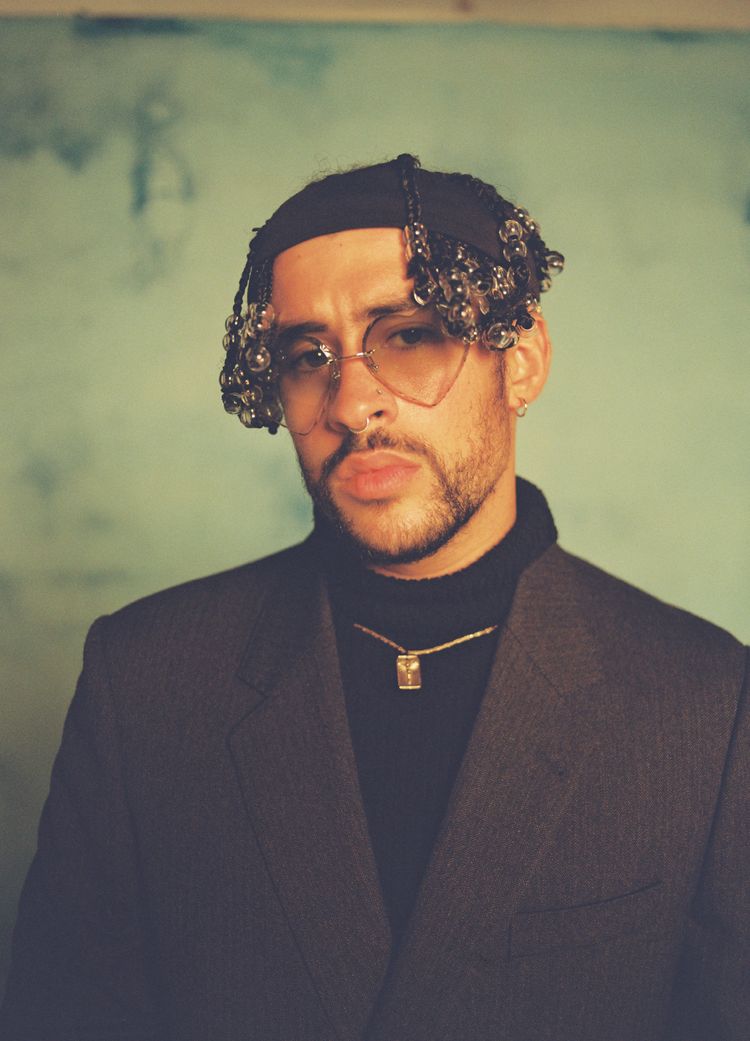Bad Bunny is at the top of his game.
In under five years, the Puerto Rican rapper has become the biggest Latin pop star on the planet. His success is transcending cultural and language barriers that can be limiting for Latin acts. He’s mainstream. After making history in December with the first all-Spanish LP to top the Billboard 200, Bad Bunny was announced as 2020’s most-streamed artist on Spotify. Now his 2022 arena tour is already sold out, and he’s the face of multiple brand partnerships, including Cheetos’ Deja Tu Huella campaign. The title translates into “Leaving Your Mark,” and that’s exactly what he’s doing.
“I’m always proud to be Latino, to be from Puerto Rico, and to be from the Caribbean, and it’s always an honor to represent that worldwide,” Bad Bunny tells SPIN in Spanish over Zoom.
Before becoming a global ambassador for Latin music, Benito Antonio Martínez Ocasio was a bag boy at a supermarket in his hometown of Vega Baja. In 2016, he uploaded his breakthrough song, “Diles,” to SoundCloud, earning the attention of Boricua producers DJ Luian and the Mambo Kingz. Every year after, Bad Bunny upped the ante on his career, from guesting on Cardi B’s chart-topper “I Like It” with J Balvin to teaming up with the Colombian rapper for their joint album Oasis.
“My life has changed a lot,” Bad Bunny says. “But at the same time, nothing has changed. I’m still the same person. I’ve grown a lot. I’ve learned and made mistakes, but I still have the same passion for what I do. I keep doing what I like.”

That mantra became the basis for Bad Bunny’s second album, YHLQMDLG (an acronym from Spanish short-hand that translates to “I Do Whatever I Want”). He took reggaeton music into the future while paying homage to Puerto Rico’s perreo roots laid down by the genre’s pioneers like Daddy Yankee, Tego Caulderón and Don Omar. The album debuted at No. 2 on the Billboard 200 — and it earned the two-time Latin Grammy winner his first American Grammy for Best Latin Urban/Pop Album.
“It was really cool,” Bad Bunny says of the victories. “The coolest thing was when [Trevor Noah] mentioned the album’s name, he spelled it out in English. I was very happy. Those achievements always make you feel proud of all the work that you’re doing.”
While people were at home during the COVID-19 pandemic in 2020, Bad Bunny’s music kept them company. Following YHLQMDLG, he released his November follow-up, El Último Tour Del Mundo, which gave Latin trap an alternative rock twist. And Bad Bunny surpassed YHLQMDLG by opening atop the Billboard 200 — the first time an all-Spanish album reached the summit. Unlike the Latin pop stars before him, Bad Bunny hasn’t had to sing in English to be successful.
“For me, Spanish is fucking cool, more than English,” Bad Bunny says with a laugh. “I’m pleased that we are in a time where I don’t need to change anything about myself — not my musical style, not my language, not my culture — to go far. That doesn’t mean I’ll never sing in English. I already sang in Japanese, so maybe one day I’ll sing in English. It feels great to do things my way.”
After going into the top 10 of the all-genre Hot 100 chart with Cardi B, Drake and Jhay Cortez, Bad Bunny achieved his first solo top 10 with this year’s “Yonaguni” — a moody reggaeton love song that includes the aforementioned bit in Japanese.
“I enjoyed [singing in Japanese] a lot because learning that part and getting to pronounce it correctly was incredibly challenging,” Bad Bunny says. “Inside the studio, that was something different for me. I can’t wait to sing it live and see who sings along in the audience.”
With a global platform, Bad Bunny also uses his music to push back on machismo, or the toxic masculinity ingrained in Latino culture that puts down women and people in the LGBTQ+ community. He sang about domestic violence in “Solo De Mí” and respecting women’s space on the dance floor in “Yo Perreo Sola” while dressed in drag. “[It’s about] being human, and that’s it,” he says. “I just do what I feel both in life and on social media.”
Now with Cheetos’ Deja Tu Huella campaign, Bad Bunny is giving back to the Latino community. Through TikTok, they will award $50,000 each to 10 students who post videos showing them doing good in their communities. (Entrants must tag @Cheetos, #DejaTuHuella, and #Entry.) Bad Bunny also designed a fashion collection inspired by Chester Cheetah with Cheetos and Adidas that will be available on Aug. 6. Fans sign up for early access here.

About the legacy he hopes to leave behind, Bad Bunny says, “I want people to remember me as someone genuine, someone with a big heart. For being myself. That’s what leaving your mark is about, doing something that represents who you really are.”





